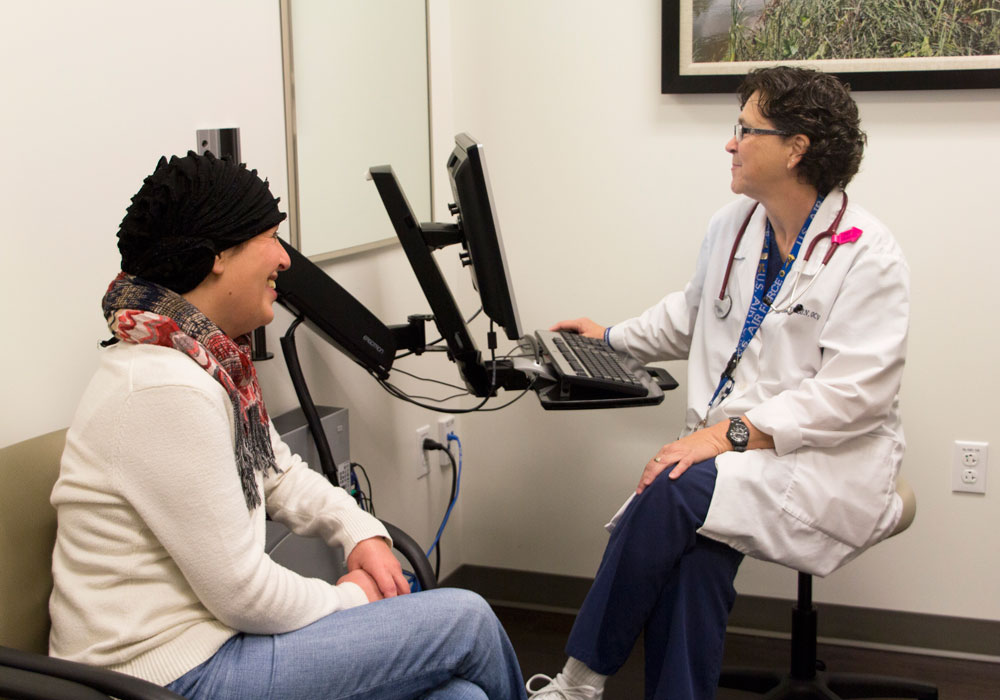By Jyothirmai Gubili, MS, Stacie Corcoran, RN, MS, and Jun J. Mao, MD, MSCE
Hot flashes, also known as hot flushes, are marked by periods of sudden, intense feelings of warmth that begin at the chest and radiate to the neck and face, along with flushing, sweating, and heart palpitations, lasting several seconds to minutes. Compared to healthy postmenopausal women, breast cancer patients and survivors are prone to experiencing more severe and longer-lasting hot flashes. A bothersome symptom, hot flashes can occur anytime during a 24-hour period, but those occurring at night are most troubling because they interfere with sleep. Sleep deprivation negatively impacts daytime functioning as well as pain, fatigue, depression, and anxiety levels, diminishing quality of life significantly.
Nonhormonal treatments such as venlafaxine, gabapentin, citalopram, and clonidine have shown utility but are associated with adverse effects that include dizziness, headaches, and drowsiness. As patient educators, oncology nurses play a key role in helping patients manage their post-treatment physical and psychological health. Nurses caring for the growing number of breast cancer survivors should have sound knowledge of established treatment options as well as emerging interventions, such as acupuncture, in addressing hot flashes.
Evidence Supporting Acupuncture
Acupuncture, an important part of traditional Chinese medicine, involves placing fine needles, sometimes with electricity (electroacupuncture) to enhance the therapeutic effect, on one or more predetermined points on the body. Its value in alleviating pain, postoperative and chemotherapy-induced nausea and vomiting, xerostomia, and chemotherapy-induced peripheral neuropathy has been well documented. Acupuncture is recommended for managing cancer symptoms by more than 60% of National Cancer Institute (NCI)-designated comprehensive cancer centers.
Growing evidence suggests that acupuncture may also be useful in controlling hot flashes.
A 2015 systematic review of eight randomized trials of patients with breast cancer reported significant improvements in hot flashes following acupuncture, although the conclusions were not definitive because the studies were designed poorly. But in a recent trial of 190 patients with breast cancer randomized to manual acupuncture or enhanced self-care, acupuncture not only decreased hot flash scores by the end of the trial, but also at three-month and six-month follow-up visits. In addition, significant improvement was reported in quality of life in the acupuncture group.
A 2015 randomized trial also reported favorable outcomes in which 120 breast cancer survivors experiencing hot flashes were assigned to electroacupuncture, sham acupuncture, gabapentin, or placebo pills for eight weeks. Results showed the effects of electroacupuncture to be comparable to, durable, and with fewer adverse effects than gabapentin. Even though the effect size of electroacupuncture was small compared to sham treatment at week 8, it improved considerably at week 24. This suggests that electroacupuncture may exert longer-lasting physiological effects. In another study involving breast cancer survivors experiencing hot flashes, electroacupuncture was found to be comparable to gabapentin in improving sleep. The mechanisms of action are not fully known, but studies thus far indicate that electroacupuncture mediates its effects via endorphins and other central neuropeptides, suggesting a physiologic basis for mitigating hot flashes.
Acupuncture is a noninvasive technique, and available evidence of its effectiveness in relieving hot flashes is promising. The treatments are generally safe when administered by credentialed practitioners and are well tolerated by most patients. Oncology nurses can provide patients with current, evidence-based information to help them make informed decisions when considering therapeutic risks and benefits. Motivated breast cancer survivors may welcome nonpharmacologic options such as acupuncture in attempting to alleviate their hot flashes.






